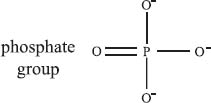BiochemistryMetabolism and Other Biochemical Reactions |
What is a kinase? |
Kinases are a class of enzyme that is responsible for transferring phosphate groups (see image below) from donor molecules, such as ATP, to substrates during a reaction called phosphorylation. These are typically named for their substrate: for example, a tyrosine kinase catalyzes the transfer of a phosphate group to a tyrosine residue of a protein. Kinases are part of a larger group of enzymes called phosphotransferases, all of which carry out chemistry involving phosphate groups, shown below.

